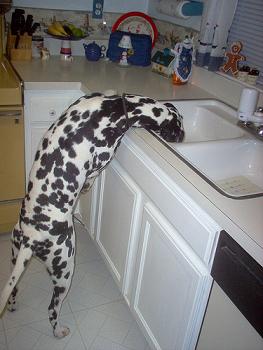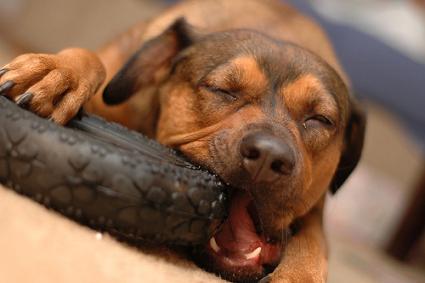Counter Surfing & Thieving Dogs
All dogs do it at some stage - whether it's counter surfing the kitchen bench, stealing the garbage, begging, thieving items from around the house or even snatching things from your hands.... they can't help themselves....
It's important to recognize that this is a perfectly natural behavior for your dog - dogs are opportunistic scavengers from way back. This does not mean that we have to simply accept the thieving problem though. There are many strategies we can undertake to prevent items from ever being stolen or to rectify an existing thieving problem.
Apart from food stealing being an extremely annoying and frustrating habit for your dog to develop, it is also potentially a very dangerous one (thieving something poisonous, a sharp item or knocking over a boiling saucepan). My Whippet Pocky still has a nasty scar on her shoulder as a result of dragging a pot of boiling water down from the bench.

Why Do Our Dogs
Steal Things Anyway?
There are many reasons why your dog may be stealing food and other household items. Take a look through this list to determine your dog's specific trigger or reason for the counter surfing behavior:
- Stealing food and other items is a self rewarding behavior. What this means is that when your dog steals something the consequence is that something pleasurable/desirable occurs. This could be something like getting to eat the food he/she has stolen or receiving attention from you. This is a bad situation for us dog owners because the thieving behavior is being rewarded and therefore reinforced each time your dog steals something. This means that the behavior is highly likely to continue and will most probably get worse in the future.
- Some dogs steal items of food simply because they don't know any better - they have never been properly taught that it is inappropriate behavior.
- The thieving may be a symptom of canine separation anxiety. Dogs will often steal things like socks or shoes which have the scent of the owner they are missing on them.
- Many dogs use their thieving as a tactic to receive attention from you. They learn that as soon as they pick up a shoe or cushion it gets you to chase after them - a fun game!
- If you don't leave some tasty chew toys around for your dog it is highly likely that they will find something else to chew on - like your expensive rug.
- Obviously if your dog is hungry he is far more likely to scavenge (counter surf) for food on bench tops and tables.
- A lack of adequate obedience training can lead to this type of behavioral problem. Your dog may not respect you or may see himself as above you in the family pack hierachy. This means that he will feel free and even entitled to help himself to anything around the house.
- Boredom and a lack of exercise can lead to more thieving as well as many other behavior problems.
- A young puppy who is yet to learn proper household etiquette is not equipped to be left alone around food and other dangerous chewable items.

What Can We Do
To Stop The Thieving!
The answer to this is not clear cut and you will probably need to implement more than one method. What you must to do is determine the reason for your dog's stealing habit and then come up with an action plan to put a stop to it.
Here are some general tips to help stop counter surfing and other stealing behavior. You can put these general strategies to work right now:
- Keep food and other items out of reach - prevention is always the best option in dog training. This involves things like clearing all bench tops and locking garbage bins. By doing this you are removing the thing that is motivating and then reinforcing your dog's stealing habit.
- Supervision is the key to correcting a thieving dog. When you are present you can provide your dog with instant feedback regarding his behavior. This includes both positive and negative feedback.
- Only ever feed your dog from his dinner bowl or as a reward during obedience training sessions. This means never throwing scraps to your dog from your dinner plate or when you are preparing your dinner. In fact it is a good idea to give your dog a stuffed kong toy when you are preparing your dinner.
- Provide your dog with loads of physical and mental stimulation throughout the day. Nice long walks on the leash, fun games like hide and seek and some obedience training are all great for this purpose.
- Never chase, yell, hit or give attention to your dog when he steals an item - this is the response he wants from you!
- Always reward desirable behavior. If your dog is sitting calmly on his bed while you are preparing your dinner praise and reward him with a tasty treat. This is really an obedience training exercise so it's ok to give your dog a reward in this situation. When a dog is rewarded that behavior is reinforced and is likely to continue in the future (which is what you desire in this example).
Proven Strategies To Stop Your Dog From Thieving
Depending on the specific thieving problem you and your dog have you can pick out one or more of the following methods to help. Continue to implement the general points listed above and then add one or more of the specific strategies listed below. Good luck - I'm sure you'll get the results you are after.
- Obedience training is the key to preventing and solving most behavior problems - including counter surfing and other thieving behavior. Some basic obedience training will also build respect and strengthen the bond you and your dog share. Try this dog obedience training command to help stop the stealing in its tracks - leave it!.
- Set up a "booby trap" for your dog. This method is designed so that your dog learns to associate stealing with an unpleasant consequence (not cruel or painful). This method works best for dogs who steal from one place in particular - such as your coffee table. You can achieve this unpleasant consequence through the following strategies:
- Place some tasty meat on the kitchen bench. Tie some cord to the meat and at the other end tie some empty tin cans with some pebbles or coins in them. When your dog counter surfs to grab the meat he will get a nasty surprise when the tin cans come crashing down. Ideally you will be there to witness this happen. You should immediately say "ah ah!!" and snatch the meat away before your dog eats it (most dogs drop the meat when the cans come crashing down).
- You can also buy some foul tasting substances at your local pet store for this purpose. Put some of this liquid on the "bait" and wait for your dog to try to steal it. The idea is that the food from benchtops will become unappealing to your dog and therefore he will discontinue his thieving as there is nothing in it for him.
- Another method I have used with success with my cheeky whippet "Pocky" involves a water pistol. This method requires you to spy on your dog and then provide an unpleasant consequence to any thieving behavior - the instant it happens. If you spot your dog counter surfing the bench give her a shot of water to the face and a stern "No!". Once again this will stun your dog (not hurt her). The idea is to jump out from around the corner and surprise your dog just as she is in the act of counter surfing - but before she actually eats the food.
- Ask for an alternate behavior from your dog in situations where he may be tempted to steal. Use a command such as this - go to your spot to occupy your dog's mind and behavior. Make this spot the most special and appealing place in the whole house. If you get this one right your dog will spend a lot of time in this spot!
Check out this free video which explains a few ways to prevent counter surfing behavior - stop the thieving!
Some other pages you may be interested in:
Stop your dog's behavior problems such as excessive barking, digging, jumping up on guests and pulling on the leash now.
Please consult the services of a Professional Dog Trainer, Behaviorist or Veterinarian before implementing any of the advice contained on this site.








 Your Privacy Choices
Your Privacy Choices